Intriguing title isn’t it. The article I read was comparing play based curriculum with skill based curriculum but what I found interesting were the points it made about the value of play for all children and the benefits of play based curriculum, for those children who are in the public school realm.
In the world of leadership education there seems to be a bit of controversy about letting children play, when, where, how much, and with what. Not so different from the mainstream world is it. I think that is partly due to the end driven results that we adults seek. We let our children play but what is the end result, what is the purpose. No willy nilly free play for our children. And for goodness sakes don’t play too long or too loud or too messy or too…
 Coming from a far different era I am often just amazed at this thinking. I cannot tell you all the days that I spent aimlessly playing, by myself and with a gaggle of friends of mixed ages. No one ever thought a thing about it.
Coming from a far different era I am often just amazed at this thinking. I cannot tell you all the days that I spent aimlessly playing, by myself and with a gaggle of friends of mixed ages. No one ever thought a thing about it.
I wrote an article about the power of play in helping a child build complex, skilled, responsive, socially adept and cognitively flexible brains. I loved this quote. “For most of human history, children played by roaming near or far in packs, large and small. Younger children were supervised by older children and engaged in freewheeling imaginative play. They were pirates and princesses, aristocrats and heroes. But, while all that play might have looked a lot like time spent doing nothing much at all, it actually helped build a critical cognitive skill called executive function.”( Executive functioning skills in children)
responsive, socially adept and cognitively flexible brains. I loved this quote. “For most of human history, children played by roaming near or far in packs, large and small. Younger children were supervised by older children and engaged in freewheeling imaginative play. They were pirates and princesses, aristocrats and heroes. But, while all that play might have looked a lot like time spent doing nothing much at all, it actually helped build a critical cognitive skill called executive function.”( Executive functioning skills in children)
That describes my era perfectly and the value we gained from this free wheeling play.
Let me share some of the insights from the article with you because I think you will find them interesting too. I hope they get you thinking about your children’s need to play, to learn important skills.
 “Every day where we work, we see our young students struggling with the transition from home to school. They’re all wonderful kids, but some can’t share easily or listen in a group. Some have impulse control problems and have trouble keeping their hands to themselves; others don’t always see that actions have consequences; a few suffer terribly from separation anxiety. We’re not talking about preschool children. These are Harvard undergraduate students whom we teach and advise. They all know how to work, but some of them haven’t learned how to play.”
“Every day where we work, we see our young students struggling with the transition from home to school. They’re all wonderful kids, but some can’t share easily or listen in a group. Some have impulse control problems and have trouble keeping their hands to themselves; others don’t always see that actions have consequences; a few suffer terribly from separation anxiety. We’re not talking about preschool children. These are Harvard undergraduate students whom we teach and advise. They all know how to work, but some of them haven’t learned how to play.”
“If you want your child to succeed in college, then play-based curriculum is the way to go. Why do this? One of the best predictors of school success is the ability to control impulses.” (Isn’t that exactly what I said in my article on executive function?)
“The beauty of a play-based curriculum is that very young children can routinely observe and learn from others’ emotions and experiences. One randomized, controlled trial had 4- and 5-year-olds engage in make-believe play with adults and found substantial and durable gains in the ability of children to show self-control and to delay gratification. Countless other studies support the association between dramatic play and self-regulation.” (I might mention here that in my opinion child initiated play without adults would cause even more substantial gains than adult directed play!)
experiences. One randomized, controlled trial had 4- and 5-year-olds engage in make-believe play with adults and found substantial and durable gains in the ability of children to show self-control and to delay gratification. Countless other studies support the association between dramatic play and self-regulation.” (I might mention here that in my opinion child initiated play without adults would cause even more substantial gains than adult directed play!)
“Through play, children learn to take turns, delay gratification, negotiate conflicts, solve problems, share goals, acquire flexibility, and live with disappointment.”
 “As admissions officers at selective colleges like to say, an entire freshman class could be filled with students with perfect grades and test scores. But academic achievement in college requires readiness skills that transcend mere book learning. It requires the ability to engage actively with people and ideas. In short, it requires a deep connection with the world.” (In the leadership education world we would say, they know how to think!)
“As admissions officers at selective colleges like to say, an entire freshman class could be filled with students with perfect grades and test scores. But academic achievement in college requires readiness skills that transcend mere book learning. It requires the ability to engage actively with people and ideas. In short, it requires a deep connection with the world.” (In the leadership education world we would say, they know how to think!)
“For a five year-old, this connection begins and ends with the creating, questioning, imitating, dreaming, and sharing that characterize play. When we deny young children play, we are denying them the right to understand the world. By the time they get to college, we will have denied them the opportunity to fix the world too.”
So when you are considering how to let your children spend their time in core and love of learning think deeply about play. Think about what toys and materials actually accentuate play. Observe your children when they play. Consider the effects of video and television on play. Make time for plenty of play. Ask for spiritual guidance as you make your decisions about play. For me, reading this article on the importance of play reaffirmed what I knew as a child.
It seems that play is the stuff of what able adults are made of!
Possibly Related Posts:
- 5 Creative Writing Exercises for Kids of All Ages
- 5 Ways to Help Your Child Think Like a Scientist
- Self Care for Better Parenting – Part 2
- Self Care for Better Parenting – Part 1
- Got Kids 24/7 – 2 Tips to make life easier





{ 0 comments… add one now }